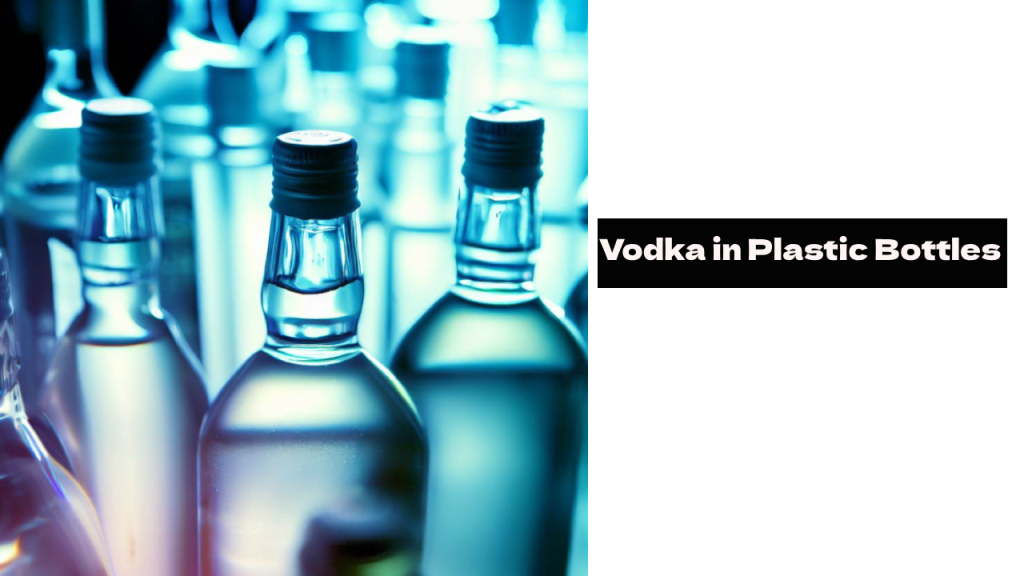The Rise of Vodka in Plastic Bottles: Trends, Benefits, and Challenges
Introduction
In recent times, the packaging of alcoholic beverages, specifically vodka, has undergone a noteworthy transformation. Traditionally associated with glass bottles, vodka is now progressively being packaged in plastic bottles. This shift has gained momentum due to various factors, including evolving consumer preferences, advancements in packaging technology, and environmental considerations.
The Shift towards Plastic Bottles
The conventional association of vodka with glass bottles is gradually evolving. The alcohol industry has witnessed a notable transition toward plastic bottle packaging in recent times. This shift is propelled by several factors, including advancements in plastic manufacturing technology and the increasing demand from consumers for more convenient and sustainable packaging alternatives.
Advantages of Plastic Bottle Packaging
Convenience and Portability
One of the primary catalysts for the surge in vodka packaged in plastic bottles lies in the convenience and portability they offer. Plastic bottles are lighter and less fragile than glass bottles, making them easier to handle and transport. Whether it’s for social gatherings, picnics, or travel, plastic bottles provide a pragmatic solution for vodka enthusiasts on the move.
Safety and Durability
Contrary to common misconceptions, plastic bottles can ensure a high level of safety and durability. Modern plastic packaging techniques guarantee that the bottles are designed to withstand breakage and leakage. Additionally, plastic bottles can be equipped with secure caps, preventing any accidental spills or tampering.
Cost-Effectiveness
From a business perspective, plastic bottle packaging offers substantial cost advantages over glass bottles. Plastic is generally more economical than glass, reducing packaging expenses for vodka manufacturers. The lightweight nature of plastic bottles also results in lower shipping costs, further contributing to the cost-effectiveness of plastic packaging.
Sustainability and Environmental Impact
Environmental considerations play a pivotal role in the rise of vodka in plastic bottles. Plastic bottles can be recycled and have a lower carbon footprint compared to glass bottles. Moreover, advancements in plastic manufacturing have led to the development of eco-friendly materials and technologies, promoting a more sustainable approach to packaging.
Challenges of Plastic Bottle Packaging
While plastic bottle packaging for vodka brings numerous advantages, it also presents challenges associated with this departure from traditional glass bottles.
Perceived Quality and Prestige
Glass bottles have long been synonymous with high-quality and premium products. Some consumers perceive plastic bottles as less prestigious or indicative of lower product quality. Vodka brands adopting plastic bottles need to overcome these perceptions and effectively communicate the quality of their products to consumers.
Potential Impact on Taste and Shelf Life
Another concern regarding plastic bottle packaging is its potential impact on the taste and shelf life of vodka. Some critics argue that plastic bottles may interact with alcohol, affecting its flavor profile over time. Manufacturers must invest in research and development to ensure that plastic packaging does not compromise the integrity and taste of the vodka.
Recycling and Waste Management
While plastic bottles are recyclable, effective recycling and waste management systems are crucial for minimizing the environmental impact. It is essential for both consumers and vodka manufacturers to prioritize proper recycling practices and support initiatives that promote recycling and responsible waste management.
The Future of Vodka Packaging
The rise of vodka in plastic bottles signifies a shift in consumer preferences and industry trends. As packaging technology continues to evolve, we can anticipate further innovations in both plastic and glass bottle designs. Future developments may include hybrid packaging solutions that combine the advantages of both materials or even alternative packaging materials that are more sustainable and environmentally friendly.
FAQ Does vodka taste different when stored in plastic bottles?
No, when stored properly, vodka in plastic bottles should not exhibit any discernible difference in taste compared to vodka stored in glass bottles. Modern plastic bottle manufacturing techniques ensure that the bottles do not interact with the alcohol, preserving its flavor profile.
Are plastic bottles more environmentally friendly than glass bottles?
Plastic bottles can be more environmentally friendly than glass bottles due to their lower carbon footprint and recyclability. However, proper recycling and waste management systems are essential to minimize their environmental impact.
Can I recycle plastic vodka bottles?
Yes, plastic vodka bottles are recyclable. Make sure to check your local recycling guidelines and dispose of them in the appropriate recycling bins to support responsible waste management.
Are plastic vodka bottles safe to use?
Yes, plastic vodka bottles are designed with safety in mind. They are made to resist breakage and leakage, ensuring the safety and integrity of the product. Always ensure the bottle is properly sealed before consumption.
Will glass bottles become obsolete in the vodka industry?
While the rise of plastic bottles in the vodka industry is significant, it is unlikely that glass bottles will become entirely obsolete. Glass bottles still hold a sense of prestige and are preferred by certain consumer segments. The future may bring a balance between plastic and glass packaging options, catering to different preferences and market segments.
